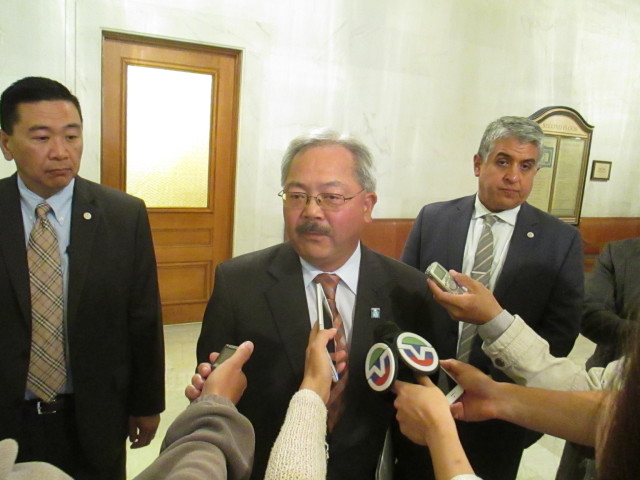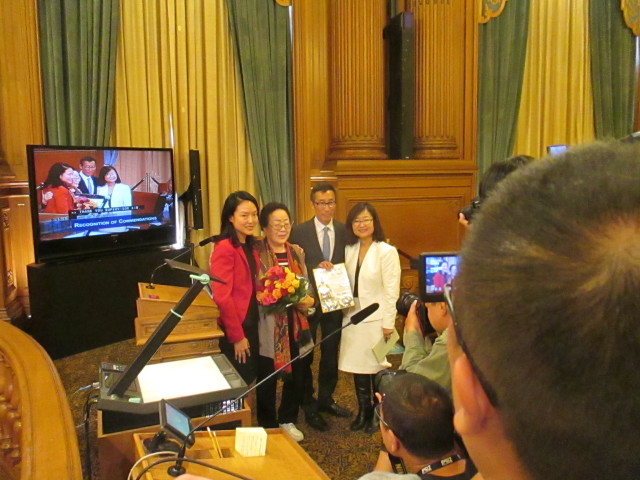Lee says low transportation impact fee is a “balance” to keep development happening

By Tim Redmond
The monthly charade that’s called Question Time – the mayor gets all the questions in writing in advance, and simply reads pre-prepared answers, the supervisors hardly ever follow up – took another step toward the absurd today when Sup. Julia Christensen threw Mayor Lee a giant softball by asking him, in essence, to tell us all what a great job he’s doing with homeless policy.
He’s doing a fine job, he said. More outreach workers, a new Navigation Center, and plans to make sure there are no more homeless veterans on the street by the end of the year.
The Navigation centers are a good idea, and I don’t doubt the mayor is trying to respond to the ongoing crisis. But he never makes any connection between the rash of evictions (caused in part by his embrace of the tech industry) and the number of homeless people on the streets.
Oh, and he didn’t mention that he’s going to tell them all to get lost when the Super Bowl party comes to town. (As one friend told me, “if it’s a choice between rich drunk Texans here to root for the Cowboys and San Francisco homeless people on the streets, I’ll take the homeless people any time.”)
But I didn’t go to the meeting to hear his speech; I went for the media’s own “question time” – the brief back and forth we get as the mayor walks from the Board chambers to his office.
This time around, a large crew of reporters wanted to talk about the proposal by Sup. Eric Mar’s to build a memorial for the so-called “comfort women” — young women captured from Korea and China by the occupying Japanese army during WWII and forced into sex slavery.
Mar invited 87-year-old Yong Soo Lee to speak at the board meeting; she’s an amazing woman who survived the sex-slave camps and became an advocate for groups that have been demanding a public apology from the Japanese government.
It was a remarkable moment when she accepted the Board’s commendation and spoke in Korean about her ordeal, her decision after decades of silence to go public with what had happened to her, and her efforts to get the world to acknowledge what the government of Japan has at times tried to hide. Sup. Jane Kim spoke of growing up in a family of Korean immigrants who talked of that horror.

The mayor so far has refused to endorse Mar’s proposal.
Outside the Board Chambers, he said he would “make time in the schedule” to meet with Lee. He said that all cities today should join together to fight modern sex trafficking. He said that he supported some sort of effort to recognize the horror that happened to Kim and thousands of other women.
But then he said that he wanted Sup. Mar to “do some more homework” and “reach out to many groups so it is not misinterpreted.” And he said he was more concerned with the present than the past.
In the end, under repeated questioning, he refused to say that he would support the memorial plan. He didn’t say no – but he didn’t say yes.
Yong Soo Lee’s assistants said she wouldn’t be taking questions from the press, so I didn’t get to ask what she was going to say to the mayor. But she was clear with the supes: She urged them to support the memorial proposal.
Then the mayor broke away and walked toward his office, and as the rest of the media went back to the chambers, I followed him to ask about the transportation sustainability fee.
The mayor is pushing to revise the fee that developers pay to mitigate the impacts that office buildings and new residential projects have on transportation. But the fee he is proposing is actually lower, compared to the impacts, than the city has charged in the past. And it would only mandate that developers pay for about 20 percent of the actual cost they are imposing on the city.
It is, in other words, a hidden giveaway to developers worth around a billion dollars over the next 15 years.
I asked: Doesn’t that mean that you and me and everyone else who uses Muni or pays taxes in this city is subsidizing developers?
Lee told me that he never expected the fee to pay for all of the costs of development. “We knew it was going to be limited,” he said. “We had to keep the balance.”
The “balance” means keeping the fee low enough that developers will continue to build big office towers. I asked: Why would we want more development if all that it means is the rest of San Francisco has to subsidize it?
The mayor said that offices create jobs, and those new workers pay taxes.
They also put demands on Muni. And the city’s own studies show that the taxes coming in are not adequate to pay for the costs of new infrastructure.
I walked out of City Hall shaking my head. It’s getting to be a habit.



